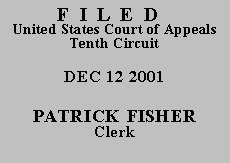

| UNITED STATES OF AMERICA,
Plaintiff-Appellee,
v.
JOSE GOMEZ-GOMEZ Defendant-Appellant. |
No. 01-4038
(D.C. No. 98-CR-89-W) (D. Utah) |
In 1988, Mr. Gomez-Gomez pled guilty in state court to possession of a controlled substance with intent to distribute. In 1989, he was convicted, again in state court, of selling cocaine. The federal government deported Mr. Gomez-Gomez in 1990 and he subsequently re-entered the United States. In 1998, Mr. Gomez-Gomez was tried and convicted of illegal re-entry of a deported alien under 8 U.S.C. § 1326(b) and sentenced to 78 months confinement under Sentencing Guideline § 2L1.2. He appealed his sentence, contending the convictions relied on to enhance his sentence were misdemeanors, not felonies. This court affirmed, holding that his two convictions were, in fact, felonies. United States v. Gomez-Gomez, No. 98-4156, 1999 WL 261235 (10th Cir. May 3, 1999).
Mr. Gomez-Gomez filed the present § 2255 motion seeking a reduction of his sentence because, he claims, he was not deported for an aggravated felony. The district court rejected this claim outright. Section 2L1.2(b)(1)(A) allows for a 16 level sentence increase if "the defendant previously was deported after a criminal conviction" when the conviction was an aggravated felony. U.S.S.G. § 2L1.2(b)(1)(A) (1997) (emphasis added). Nothing in the language of the guideline indicates that the deportation must be a result of the conviction, only that the deportation take place after such conviction. The crimes for which
Mr. Gomez-Gomez was convicted in 1988 and 1989 constitute aggravated felonies under 8 U.S.C. § 1101(a)(43).(1)
We must determine whether Mr. Gomez-Gomez is entitled to a certificate of appealability. In so determining, we examine whether he has made a substantial showing of the denial of a constitutional right. See 28 U.S.C. § 2253(c)(2). On appeal, Mr. Gomez-Gomez does not challenge the holdings of the district court. Rather, he makes two new claims that were not raised and argued below. Pro se litigants, like other litigants, are required to preserve issues for appeal by raising them below. See Green v. Dorrell, 969 F.2d 915, 917 (10th Cir. 1992). Mr. Gomez-Gomez has not attempted to articulate a reason for us to depart from the general rule that a federal appellate court does not consider an issue not passed upon below. In re Walker, 959 F.2d 894, 896 (10th Cir.1992) (quoting Singleton v. Wulff, 428 U.S. 106, 120 (1976)). See also United States v. LaHue, 261 F.3d 993, 1010-11 (2001). We therefore need not reach the merits of his claims on appeal.
We have reviewed Mr. Gomez-Gomez's briefs, the magistrate judge's order, the district court's order and judgment, and the entire record on appeal. Because Mr. Gomez-Gomez's claims were not raised below and he does not challenge the decision of the district court, we conclude that he has raised no arguments which require further proceedings, are debatable among jurists, or are subject to a different resolution on appeal. See Barefoot v. Estelle, 463 U.S. 880, 893 n.4 (1983); see also Slack v. McDaniel, 529 U.S. 473, 484 (2000). Accordingly, he has not made a substantial showing of a denial of a constitutional right. See 28 U.S.C. § 2253(c)(2).
We DENY Mr. Gomez-Gomez's request for a certificate of appealability and DISMISS the appeal.
ENTERED FOR THE COURT
Stephanie K. Seymour
Circuit Judge
*.After examining appellant's brief and the appellate record, this panel has determined unanimously that oral argument would not materially assist the determination of this appeal. See Fed. R. App. P. 34(a)(2) and 10th Cir. R. 34.1(G). The case is therefore submitted without oral argument. This order and judgment is not binding precedent, except under the doctrines of law of the case, res judicata, or collateral estoppel. The court generally disfavors the citation of orders and judgments; nevertheless, an order and judgment may be cited under the terms and conditions of 10th Cir. R. 36.3.
1.In his motion to the district court, Mr. Gomez-Gomez also claimed he was denied effective assistance of counsel. He provided no facts to support this claim and the district court denied it.